
China-US relations are at a critical juncture in fashioning global order relations in the 2020s. As Joe Biden approaches inauguration day, there is increasing speculation on what approach he will take toward China. Theories abound. There are those in foreign policy circles who are seen as “restorationists” (see Thomas Wright at TheAtlantic for these terms) who tend to have a greater focus on the cooperation component of the relationship. There are “reformists” who have come to the conclusion that competition and rivalry must define the path for US-China relations. There are those who see China as the culprit in job loss, technology theft, trade imbalances, the pandemic, climate change and other hits on American pre-eminence. And there are many with cultural, societal and business ties to China who hope for a period of predictability, and hopefully opportunity.
Clear-eyed self-interest and deep understanding of the new political dynamics need to guide Biden foreign policy. For Biden and his team, it is not just a question how to reframe US international relations after Trump, but how to shape them in response to changed circumstances, domestic constraints, and new defining elements in the global landscape.
For starters, Asia is more pressing than Europe, the Indo-Pacific region more demanding than the trans-Atlantic, China is more important than Russia, social and environmental issues are more compelling than trade and financial policies, and domestic pressures everywhere mean that international policies are now constrained by and tethered to internal conditions affecting ordinary people. Global inter-connectivity may be vividly evident, but domestic politics are dominant in defining strategic thrusts.
Biden and his team seem to “get” most of these circumstances, constraints and defining elements. But, it is not clear that the incoming Administration has yet stared down the underlying political dynamics that will define geopolitical relations among leading powers, especially how to approach China in ways that makes sense to the other significant global players, that will be effective with China and with domestic political constraints. For this, the various “schools of thought” contending with each other to define the overall narrative for US relations with China, each by themselves are less helpful than combining them to address the complexity and importance of this most crucial relationship.
The starting point has to be a clear understanding that China does indeed have strategic interests in meeting US dominance in the Pacific. Additionally, China does use the state and public resources to advance its economic dynamism, does use techniques for internal control which violate international norms on human rights, and does have the scale, scope and dynamism to be a challenger to US predominance, a rival in the Pacific and a competitor in the global economy. There is no doubt that this is the reality of China today. The hardening of Xi Jinping’s authoritarian rule in the last four years is real and worrisome.

